Transforming a landscape is not just about cultivating greenery; it’s an art form that harmonizes nature with human innovation. In our fast-paced world, modern landscape design offers innovative solutions that enhance outdoor spaces while catering to sustainability and personal style. Whether you’re looking to revamp your backyard, create a serene garden oasis, or simply elevate your curb appeal, our list of “” is here to guide you. Each idea is a stepping stone towards creating a breathtaking environment that reflects your vision and respects the planet. Expect to discover a variety of concepts that range from eco-friendly installations to minimalist aesthetics, practical layouts to vibrant plant selections. Dive in and ignite your creativity as you explore creative approaches to elevate your outdoor space!
Embrace native plants for sustainable, low-maintenance modern landscape design
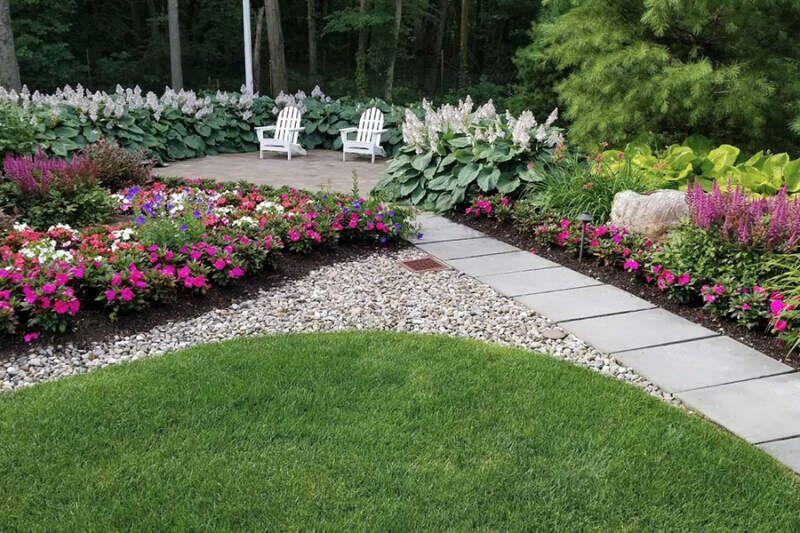
Incorporating native plants into your landscape not only enhances its aesthetic appeal but also promotes sustainability and reduces maintenance efforts. Native plants thrive in their local environments, meaning they require less water, fertilizers, and pesticides compared to non-native species. By selecting plants such as purple coneflowers, black-eyed Susans, and milkweed, you create a vibrant, low-maintenance landscape that supports local wildlife, including pollinators. These hardy plants are well-adapted to their surroundings, resulting in a more resilient landscape that can withstand climate fluctuations.
Designing with native flora allows for a modern twist on traditional landscaping, enabling you to showcase the unique beauty of your region. Consider creating layered planting beds or even a native plant garden as a focal point in your yard. Group plants of varying heights to create visual interest, or use pathways made from local stone to enhance the natural feel. Additionally, explore the concept of rain gardens that capture runoff and provide critical habitat for local species. For more inspiration and ideas for incorporating native plants into your garden, visit Audubon for guidelines tailored to your specific area.
Incorporate water features to enhance tranquility in modern landscape design
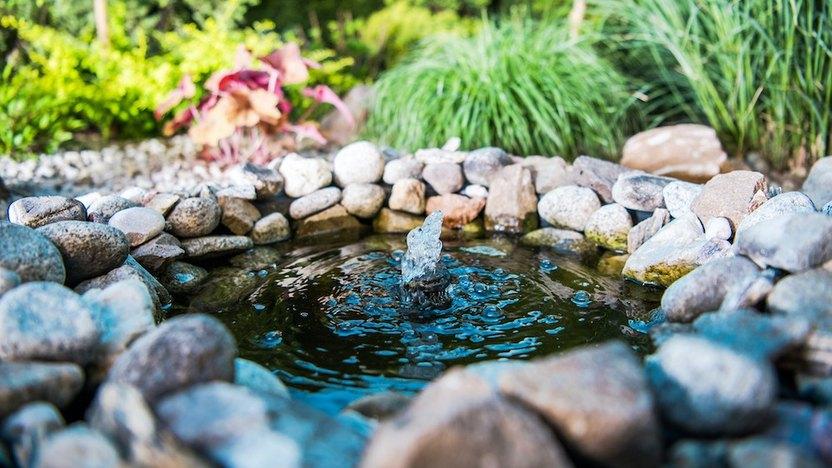
Integrating water features into modern landscape design can create an oasis of tranquility, offering a soothing ambiance that transforms outdoor spaces into serene retreats. Fountains, whether they’re sleek and contemporary or rustic and natural, provide gentle sounds that promote relaxation. Reflecting pools can serve as a stunning centerpiece, mirroring the sky and surrounding vegetation, while koi ponds bring vibrant life and movement to a garden, encouraging mindfulness as you watch the colorful fish glide through the water. Additionally, water walls can be an exquisite element, seamlessly merging structure with nature and offering the calming trickle of moving water.
To maximize the benefits of water features, consider their placement and interaction with other landscape elements. Surrounding a fountain with soft landscaping, such as lush plants and flowers, can enhance the natural feel and promote a habitat for wildlife. Incorporating LED lighting can illuminate your water feature at night, transforming your garden into an enchanting space after dark. Whether it’s a secluded corner or a striking entrance, a well-placed water element draws the eye and invites meditation and tranquility in a busy world. For more inspiration on aquatic design solutions, visit Houzz.
Utilize vertical gardens to maximize space in modern landscape design
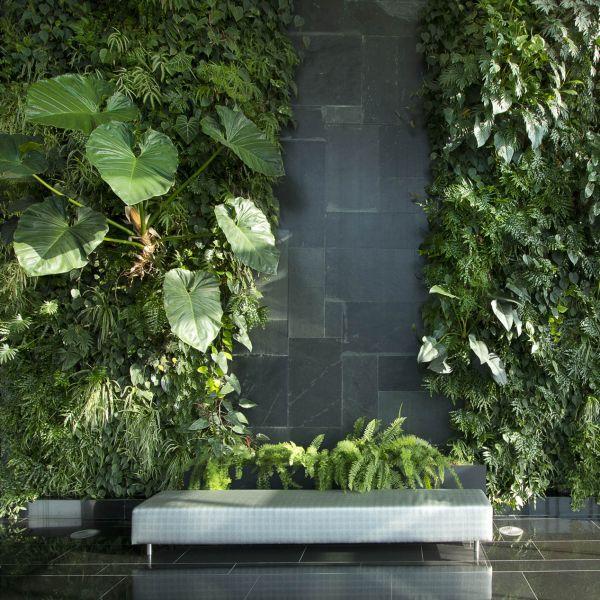
Vertical gardens are a transformative solution that not only enhances aesthetics but also optimizes space in modern landscapes. Utilizing wall-mounted planters, hanging pots, or trellises, these gardens allow you to introduce a lush array of plants in otherwise underutilized areas. Creating a vertical garden can turn a simple wall into a breathtaking living art piece that changes with the seasons and adds depth to urban settings. Think about cascading foliage that softens hard edges or vibrant flowers that draw the eye upward, offering a unique perspective of your outdoor space.
Moreover, the benefits of vertical gardens extend beyond beauty; they are also functional. Incorporating vertical farming techniques can contribute to growing edible plants, providing fresh herbs or vegetables even in small spaces. Additionally, these structures can help improve air quality and insulation around your home. To effectively plan your vertical garden, consider factors such as sun exposure and ease of maintenance. A thoughtful layout can create layers of greenery that not only maximize space but also provide habitat for local wildlife. Sites like TreeHugger offer excellent resources on sustainable garden practices that can further inspire your vertical garden projects.
Create a cozy fire pit area for social gatherings in modern landscape design
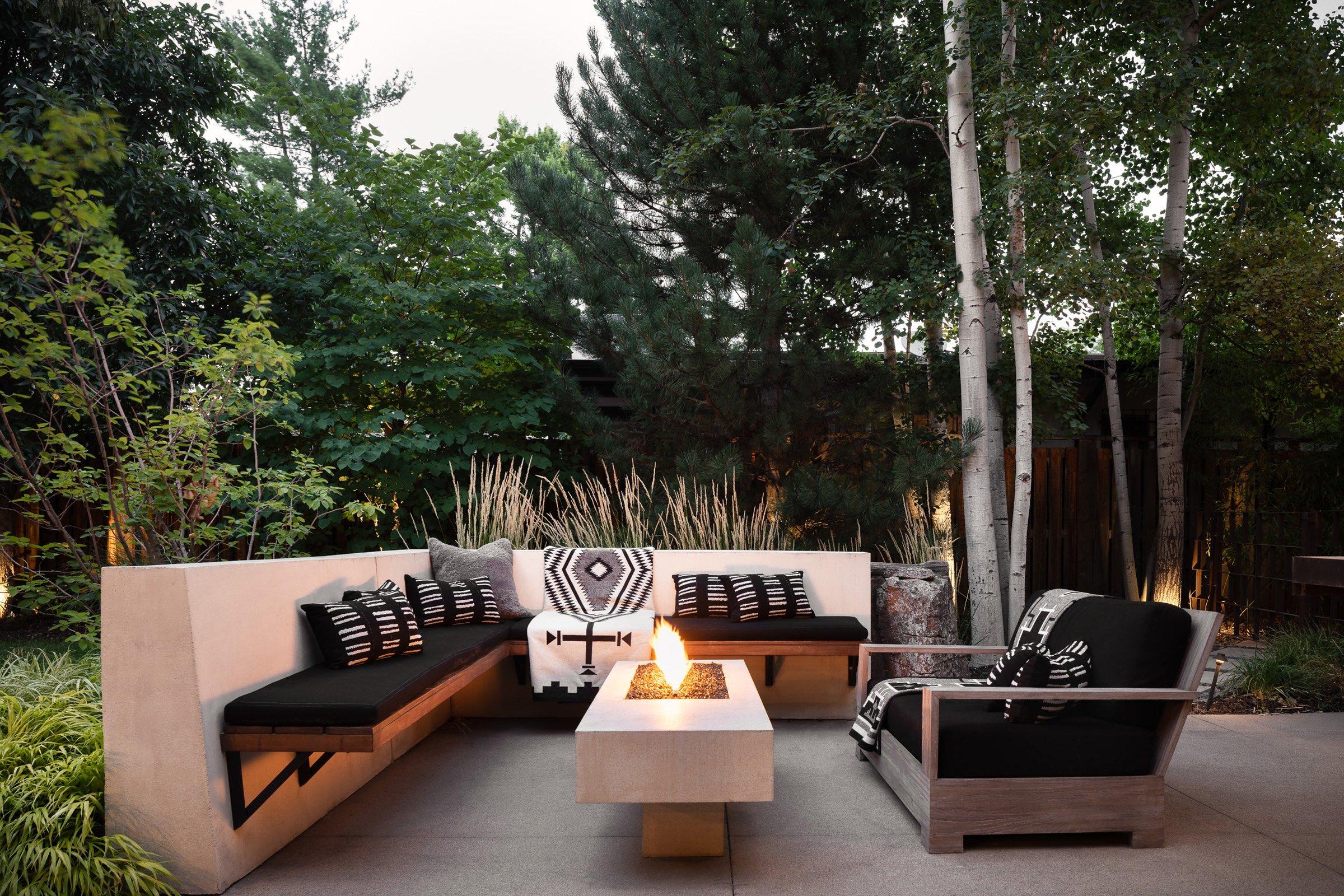
Transforming your backyard into a social haven starts with a carefully designed fire pit area that encourages warmth and conversation. Consider integrating natural stone or poured concrete to create a sleek, modern fire pit that complements your landscape. Surround it with contemporary seating, such as waterproof outdoor couches or minimalist chairs, ensuring comfort while maintaining style. Adding a coffee table or a few minimalistic side tables can enhance the functionality of the space, allowing guests to place drinks or snacks within reach.
To elevate the ambiance, consider incorporating landscape lighting that highlights the fire pit and surrounding features while adding a touch of elegance. You might want to layer different light sources, using string lights overhead for a festive touch, or pathway lights to guide guests to the area. Use decorative pillows and throws in your fire pit seating to invite relaxation. a few strategically placed planters with drought-resistant plants can serve as beautiful natural dividers, creating a cozy cocoon for gatherings. For inspiration on fire pit designs, visit houzz.com.
Integrate smart technology for efficient modern landscape design maintenance
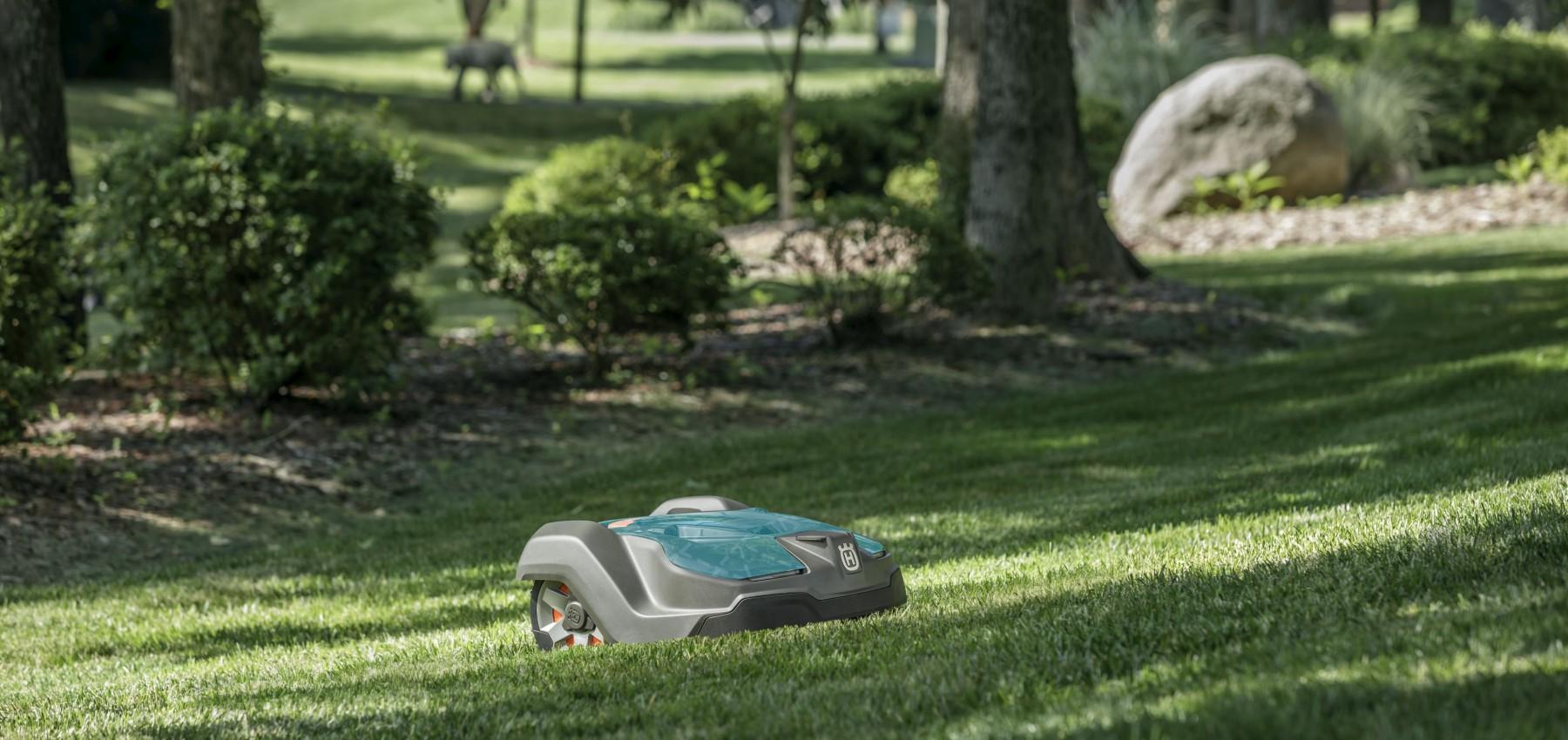
Harnessing the power of smart technology can elevate your landscape design maintenance from mundane to magnificent. With the integration of automated irrigation systems, you can monitor soil moisture levels and water your plants only when necessary, optimizing resource utilization. Furthermore, consider smart lighting that adjusts based on the time of day, enhancing the ambiance of your outdoor space while reducing energy consumption. Incorporate weather sensors to adapt your landscape maintenance schedule based on real-time atmospheric conditions, ensuring your garden thrives in tune with nature.
In addition to enhancing maintenance routines, implementing mobile applications for landscape management can provide real-time insights and alerts directly to your smartphone. Features like plant identification and care reminders can help both novice and seasoned gardeners maintain plant health with precision. Implementing drones for aerial imagery can provide a whole new perspective on landscape upkeep, allowing for detailed assessments of plant health and landscape layout. By embracing these innovative tools, you can ensure that your outdoor spaces remain lush and inviting with minimal effort. Explore more smart tech solutions at Smart Gardener.
Use bold geometric patterns in hardscaping for striking modern landscape design
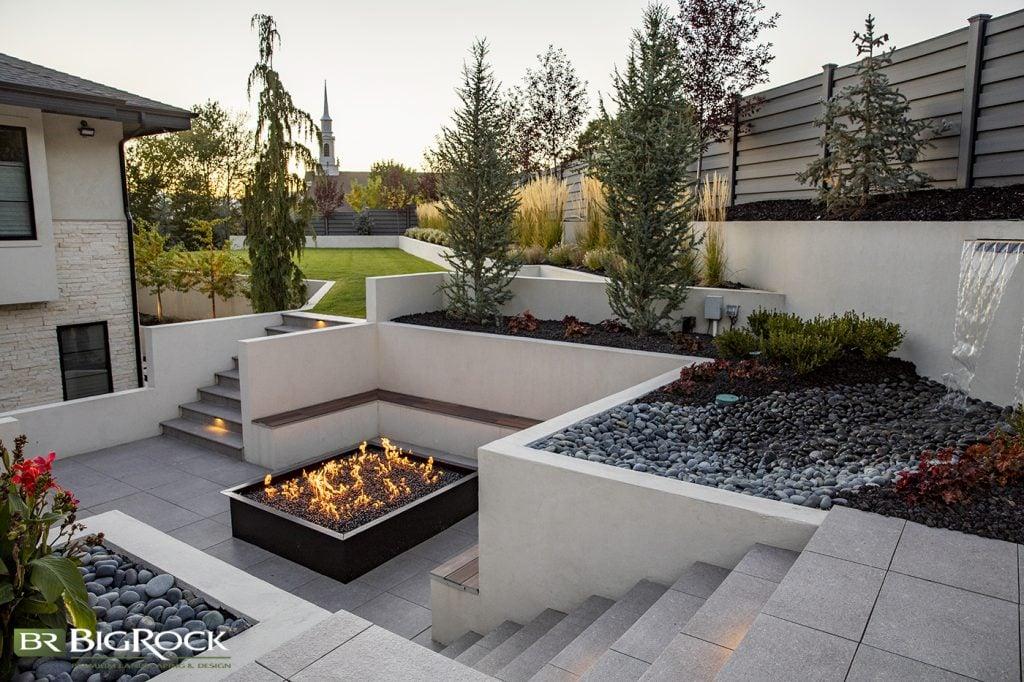
Utilizing bold geometric patterns in hardscaping can elevate your outdoor space into a modern oasis. Consider incorporating triangular pavers, hexagonal tiles, or striped concrete to create visual interest and a sense of rhythm that draws the eye across the landscape. Such designs not only offer aesthetic appeal but also serve practical purposes. They can guide traffic flow, delineate spaces, or highlight features like fire pits and seating areas. Experimenting with colors—think cool grays mixed with vibrant reds or earthy tones alongside stark whites—can further enhance the modern vibe.
Another innovative approach is to integrate raised geometric beds or slatted wood borders that echo the hardscape patterns. These elements juxtapose softness with structure, fostering a harmonious balance in the design. To deepen the visual impact, consider planting succulents or architectural grasses that resonate with the angular shapes of your hardscaping. An inviting outdoor space that’s both modern and functional can easily be achieved with these striking designs. For more inspiration on modern landscapes, check out Architectural Digest.
| Pattern Type | Materials | Design Benefits |
|---|---|---|
| Triangular Pavers | Concrete, Stone | Dynamic visual flow |
| Hexagonal Tiles | Ceramic, Porcelain | Unique texture |
| Striped Concrete | Colored Concrete | Bold contrast |
Combine textures with varied plants to add depth to modern landscape design
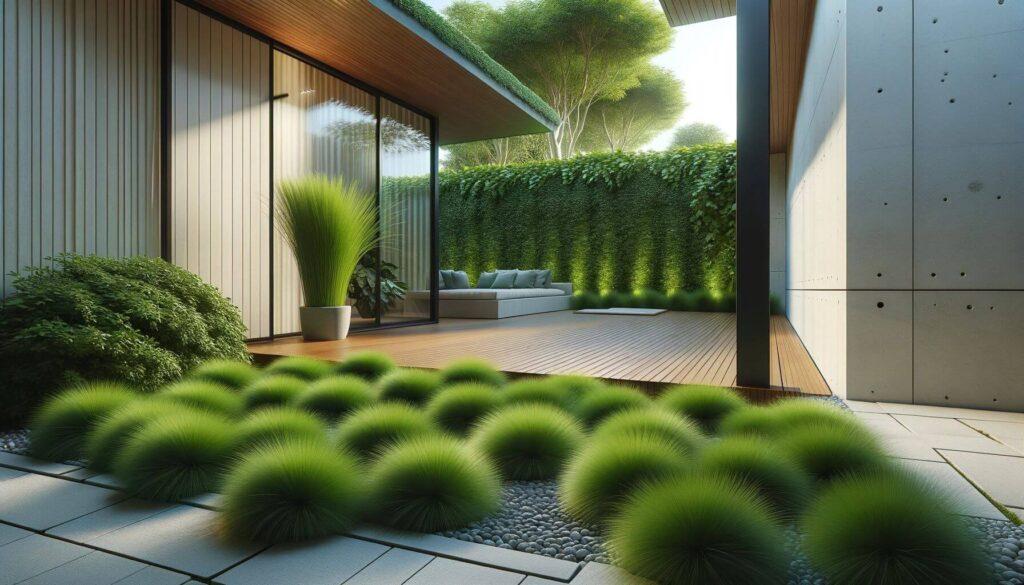
In modern landscape design, combining different textures through a variety of plants can create stunning visual depth and intrigue. Consider incorporating fuzzy, smooth, and spiky foliage to attract the eye and engage the senses. To achieve a balanced yet dynamic design, choose plants like soft lamb’s ears paired with sharp ornamental grasses, and succulent varieties that lend a unique touch. Layering these textures not only enhances aesthetic appeal but can also evoke feelings of tranquility and complexity within outdoor spaces.
For a more curated look, think about using a mix of tall, medium, and low-growing plants to create varying heights and shadows that change with the light. Group plants with similar care needs together to streamline maintenance while experimenting with bold combinations. Here’s a quick guide:**
| Plant Type | Texture | Height |
|---|---|---|
| Lamb’s Ear | Fuzzy | Low |
| Blue Fescue | Fine | Medium |
| Yucca | Spiky | Tall |
Experiment with the layout and arrangement of these plants to highlight the differences in texture and color. An online resource like The Spruce offers additional insights and ideas for selecting and pairing plants effectively. Ultimately, the combination of varied textures can transform any space into a modern landscape that feels rich and inviting.
Employ edible landscaping to merge beauty and functionality in modern landscape design
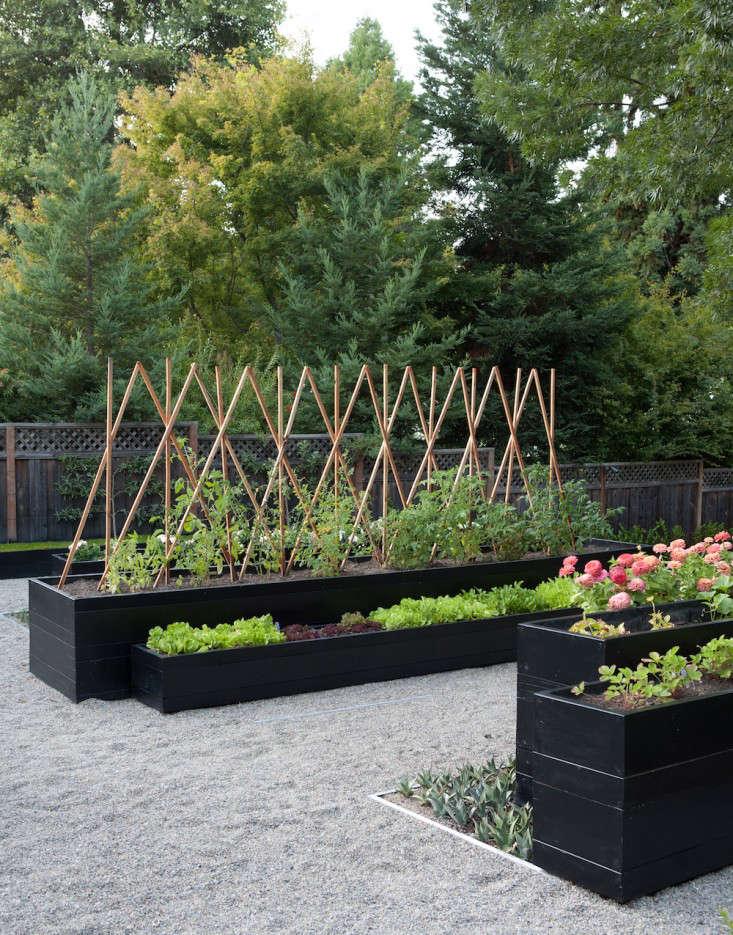
Transforming your outdoor spaces into a harmonious blend of beauty and utility can elevate both your garden’s aesthetic and its productivity. Incorporating edible landscaping allows you to cultivate visually stunning environments filled with biodiversity, enhancing your landscape while providing fresh produce. Consider the following elements to create this unique fusion:
- Fruit Trees as Centerpieces: Use dwarf fruit trees like cherries or apples to create vertical interest in your landscape.
- Herb Spiral: Construct a spiral garden that maximizes space and showcases a variety of herbs, providing easy access and a stunning focal point.
- Edible Flower Beds: Plant vibrant edible flowers like nasturtiums and pansies that lure pollinators and add color to salads.
- Vegetable Trellises: Towering trellises can support climbing vegetables like peas and tomatoes while serving as an architectural feature.
- Ground Covers: Use low-growing berry plants such as strawberries to create attractive, edible ground covers that suppress weeds.
Implementing these concepts not only enhances the visual appeal of your garden but also encourages sustainable living and healthy eating. Consider using vegetable patches strategically placed to be both functional and scenic, creating a peaceful atmosphere where nature feels inviting.
| Edible Landscapes | Benefits |
|---|---|
| Drought-Resistant Herbs | Conserve water and provide flavor. |
| Companion Planting | Enhances growth and deters pests. |
| Colorful Produce Gardens | Creates striking visuals and attracts wildlife. |
Embracing edible landscaping will allow your outdoor area to resonate with vitality, each plant contributing beauty and nourishment. For more inspiration, visit edible landscaping resources that offer additional tips and innovative designs to create stunning outdoor environments.
Design multi-functional outdoor furniture for maximizing usage in modern landscape design
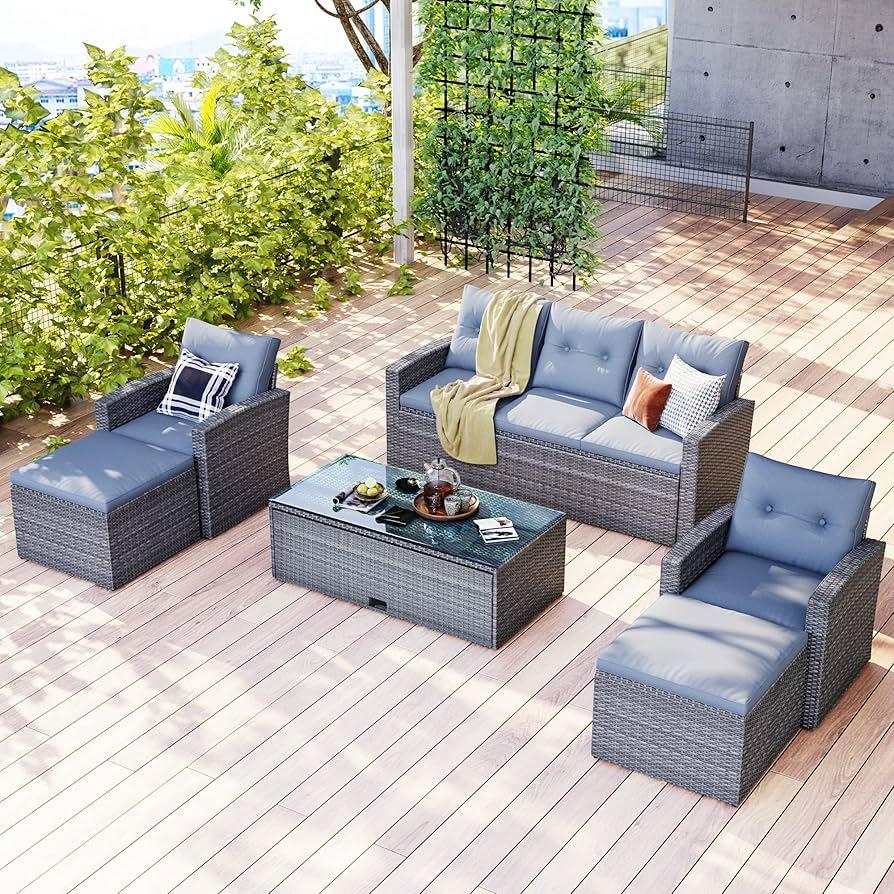
In today’s fast-paced lifestyle, outdoor spaces serve as both relaxation sanctuaries and social hubs. To make the most of your modern landscape design, consider multi-functional outdoor furniture that seamlessly blends functionality with aesthetics. Convertible benches that transform into dining tables can accommodate unexpected guests, while lounge chairs with built-in storage for cushions or blankets keep your area tidy. You can also explore options like swinging daybeds that provide both lounging comfort and a playful element for the whole family.
With innovation at our fingertips, furniture designs now include integrated planters or fire pits, encouraging creativity and interaction. Ottomans that double as tables or extra seating not only save space but also enhance the visual appeal of your garden. Embrace modular designs that allow you to customize your setup according to the season or occasion. By investing in versatile pieces, you turn your outdoor area into a dynamic environment, perfect for everything from intimate dinners to lively gatherings. For more examples of multi-functional outdoor designs, check out Apartment Therapy.
Implement soft lighting to create ambiance in modern landscape design
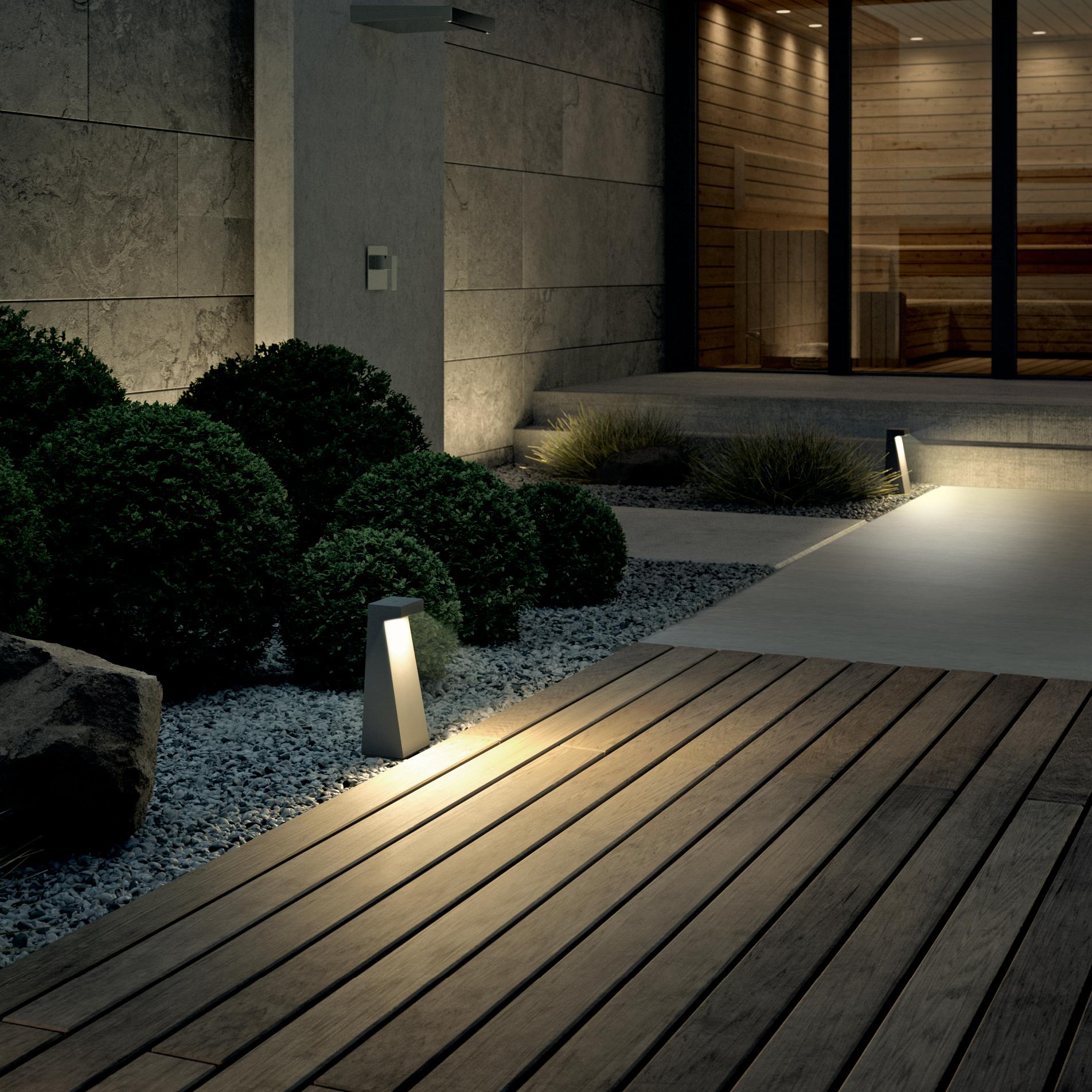
Soft lighting plays a crucial role in enhancing the overall atmosphere of your modern landscape design. By strategically placing lights, you can transform ordinary outdoor spaces into captivating environments. Consider using LED string lights to add a delicate touch to trees or pergolas, creating a whimsical feel. In addition, solar path lights can illuminate walkways without overwhelming the natural beauty of your garden. They not only guide guests safely but also highlight the unique features of your landscape.
For those looking for a bolder approach, incorporating ground-level lighting can effectively accentuate plants and architectural elements. Illuminated planters or recessed lights around a water feature can provide drama after sunset. Another innovative idea is to use colored lights to change the mood of your outdoor space. By experimenting with various hues, you can set the tone for gatherings, from cozy dinners to vibrant parties. For more inspiration and examples, visit Houzz where numerous landscape lighting ideas abound.
Explore sustainable materials for eco-friendly modern landscape design
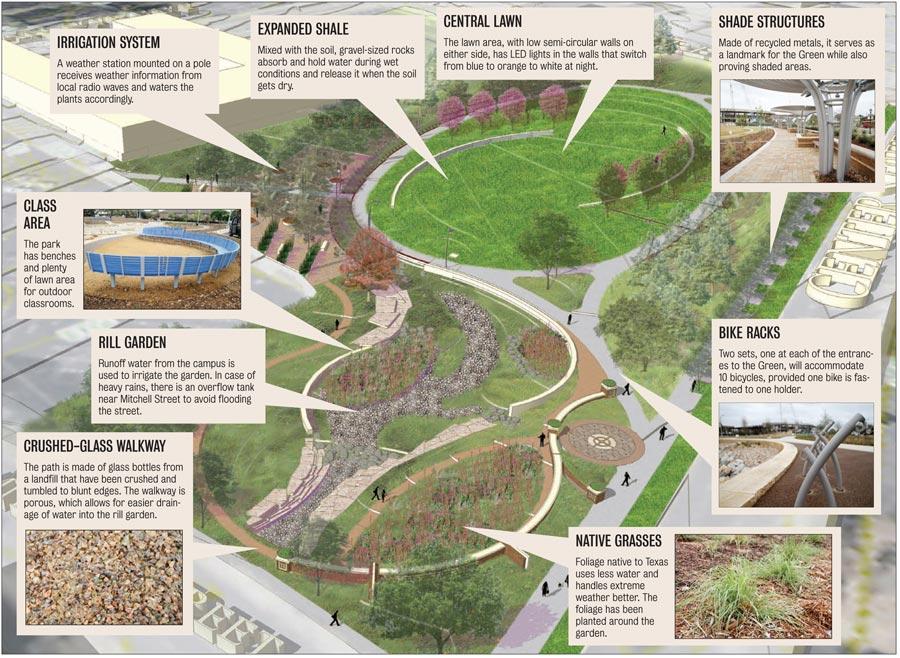
- Bamboo: A highly sustainable material, bamboo is not only fast-growing but also incredibly strong, making it perfect for fences, decking, and furniture in gardens. Its natural aesthetic adds an organic touch that resonates well with modern designs.
- Recycled Composites: Utilizing recycled materials, such as plastic and wood fibers, creates eco-friendly composite decking and landscaping features that are durable and long-lasting. They mimic the look of traditional wood without the ecological footprint.
- Native Plants: Incorporating native flora into your landscape reduces water usage and promotes local biodiversity. Native plants require less maintenance and are perfectly adapted to the local climate, adding beauty without extensive upkeep.
| Material | Benefits |
|---|---|
| Bamboo | Fast-growing and strong |
| Recycled Composites | Durable and eco-friendly |
| Native Plants | Low maintenance and drought-resistant |
Exploring options like rammed earth, which utilizes compacted soil for walls and structures, can create striking visual effects while also ensuring thermal benefits. Likewise, using local stone or salvaged materials not only reduces transportation costs and emissions but also brings a sense of place to your landscape. Remember to consider green roofs or living walls which not only enhance aesthetics but improve insulation, reduce urban heat, and provide natural habitats for wildlife.
Material choices can drastically shift the ecological footprint of your landscape without sacrificing style. Opting for reclaimed wood for outdoor furniture and planters can add character and charm, while also keeping materials out of landfills. For more ideas on sustainable practices, check out Green Building Advisor. These selections help redefine modern landscape design by merging sustainability with contemporary aesthetics, leaving a minimal impact on the environment.
Use walkways to guide visitors through contemporary modern landscape design elements
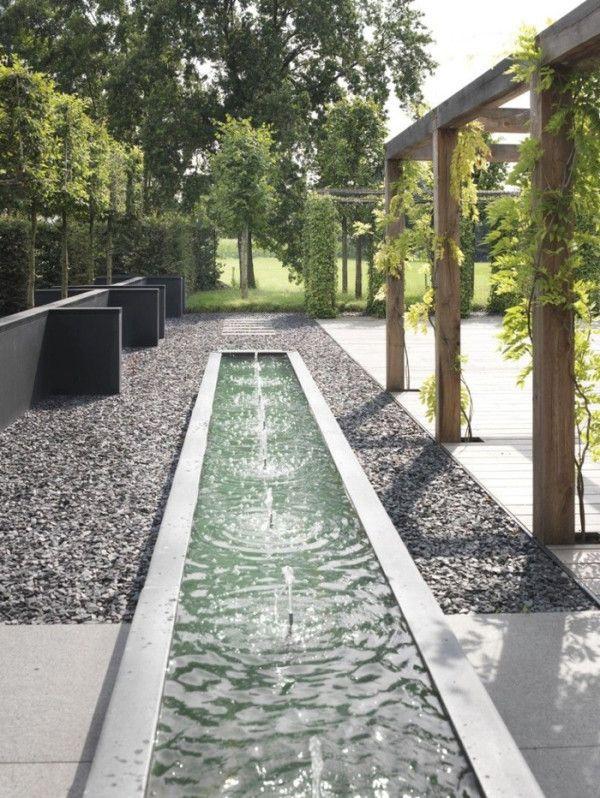
Creating an inviting atmosphere in modern landscapes begins with well-designed walkways that seamlessly intertwine with the surrounding elements. Walkways can serve as the main arteries of your outdoor space, guiding visitors through lush gardens, vibrant floral displays, and artistic installations. Utilize materials such as smooth concrete, elegant gravel, or rustic natural stones to fit the stylistic theme. Lighting elements along the paths, such as recessed fixtures or solar-powered lanterns, not only enhance safety but also add to the allure of your landscape during twilight hours.
Incorporate subtle curves and dynamic shapes into your pathway designs to encourage exploration and foster a sense of adventure. You can break the rigidity of straight lines by adding seating areas or decorative elements like sculptures and fountains along the walkways, creating cozy rest stops for visitors. Consider using ground cover plants on either side of the walkway to provide texture and contrast while maintaining a modern aesthetic. For more insights on contemporary design elements, check out Architectural Digest.
Include privacy screens to create secluded spaces in modern landscape design
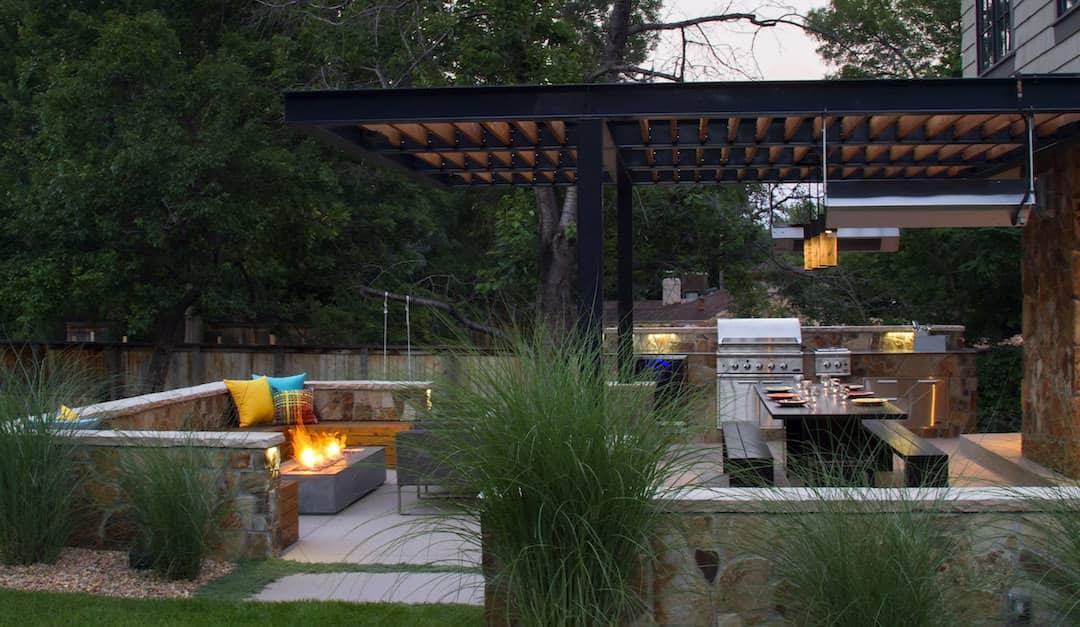
Integrating privacy screens into your landscape design not only enhances aesthetic appeal but also offers a retreat from the bustling world outside. Utilize material diversity such as timber, steel, or even trellises adorned with climbing plants to create unique barriers. These secluded spaces can serve multiple purposes; whether it’s a cozy reading nook or an outdoor dining area, thoughtful placement of privacy screens can transform an average yard into a sanctuary. Consider living screens with hedges, which not only provide seclusion but also bring lush greenery into your space. Add ambient lighting around these areas, and you may find the perfect blend of comfort and style after dark.
Incorporating architectural elements further enhances your privacy zones. Options like pergolas, cedar fences, or even artistic concrete walls can add a modern flair while still providing separation from neighbors or busy streets. Forging a connection between nature and design is key; integrate seating areas or firepits next to these screens to encourage gatherings while retaining privacy. The right screens can turn an outdoor landscape into an elegant extension of your home, promoting interaction with nature while maintaining a sense of seclusion. Explore more ideas at Architectural Digest.
Add sculptures to enrich visual interest in modern landscape design
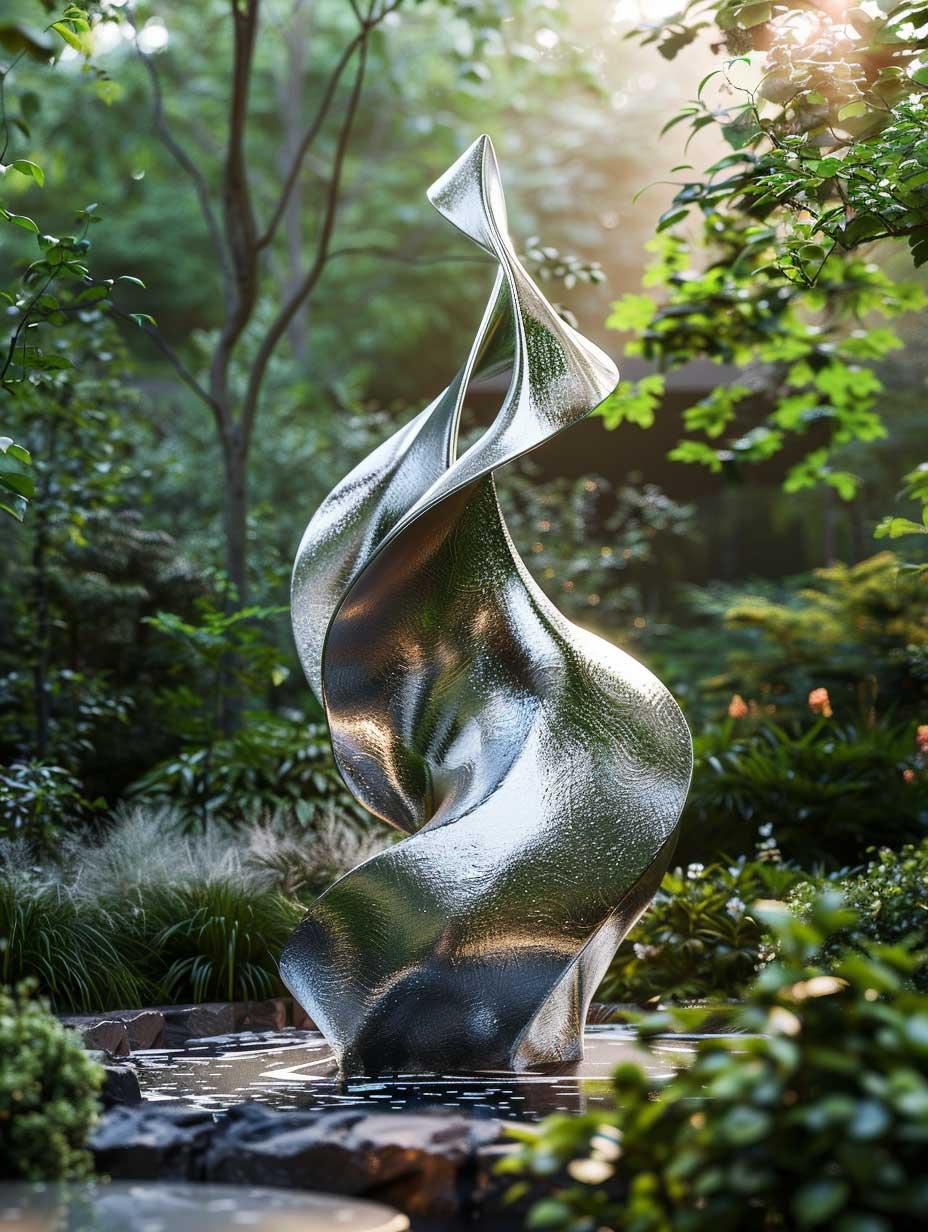
Integrating sculptures into your landscape can dramatically enhance the visual appeal and create focal points that engage the senses. From abstract forms to naturalistic designs, sculptures act as conversation starters, encouraging visitors to explore your outdoor space. Consider placing oversized art pieces at the entrance of your garden or incorporating smaller sculptures along paths and patios for a delightful surprise. The play of light and shadow as the sun moves throughout the day also adds dynamic interest, transforming the piece into a living art experience.
When selecting sculptures, think about the materials and colors that will harmonize with your existing landscape. A few popular materials include:
- Metal: Rusted steel for a contemporary edge
- Wood: Carved pieces that blend with natural surroundings
- Stone: Textured sculptures for a classic touch
You can also opt for interactive sculptures, such as kinetic art, which engages viewers through movement. Remember to consider scale and proportion to ensure your sculptures complement rather than overwhelm your design. For more inspiration on integrating art into your landscape, you can visit artnews.com.
Choose a bold color palette to invigorate your modern landscape design
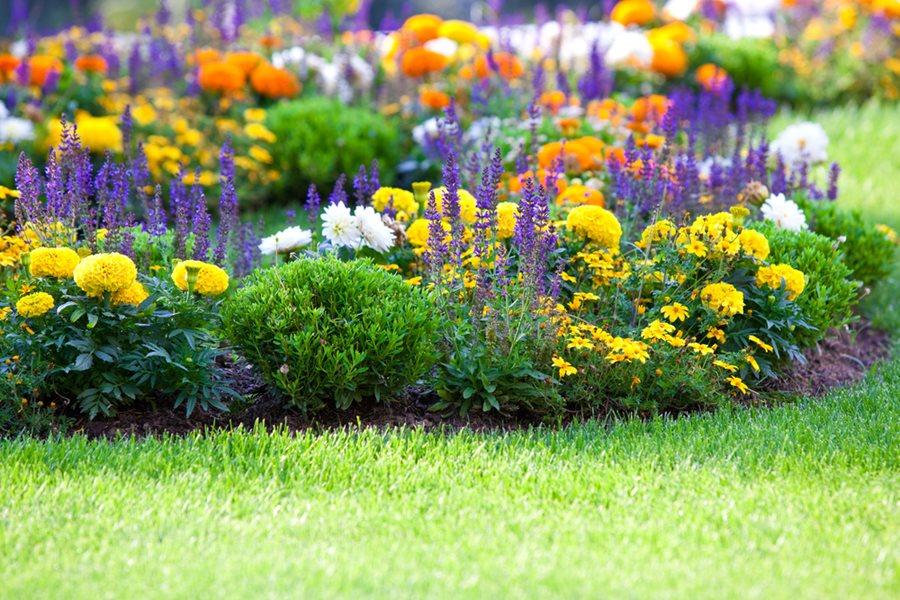
Incorporating a vibrant color palette into your modern landscape design can breathe life into your outdoor spaces and create a striking visual experience. Start by selecting bold hues that complement the natural environment, such as deep blues, vivid oranges, and lush greens. By integrating colorful plants, unique hardscaping materials, and decorative elements, you can transform a mundane garden into an engaging oasis. Consider color-blocked flower beds or container gardens that splash color across your landscape while maintaining harmony with the modern aesthetic.
To ensure your design doesn’t fall flat, balance the bold colors with neutral bases—think sleek patio stones or minimalist furniture—to create a cohesive look. Here are some elements to consider when planning your color choices:
| Color | Effect | Recommended Plants |
|---|---|---|
| Deep Blue | Creates calmness | Bluebells, Hydrangeas |
| Vivid Orange | Stimulates energy | Marigolds, Daylilies |
| Lush Green | Promotes tranquility | Ferns, Bamboo |
Explore complementary decoration options like outdoor rugs, cushions, and decorative pots that emphasize your chosen palette. Not only will the colors invigorate your space, but they’ll also reflect your personal style and enhance the overall atmosphere of your modern landscape design. To gather more ideas and inspiration, visit Houzz.
Incorporate raised garden beds for versatile planting in modern landscape design
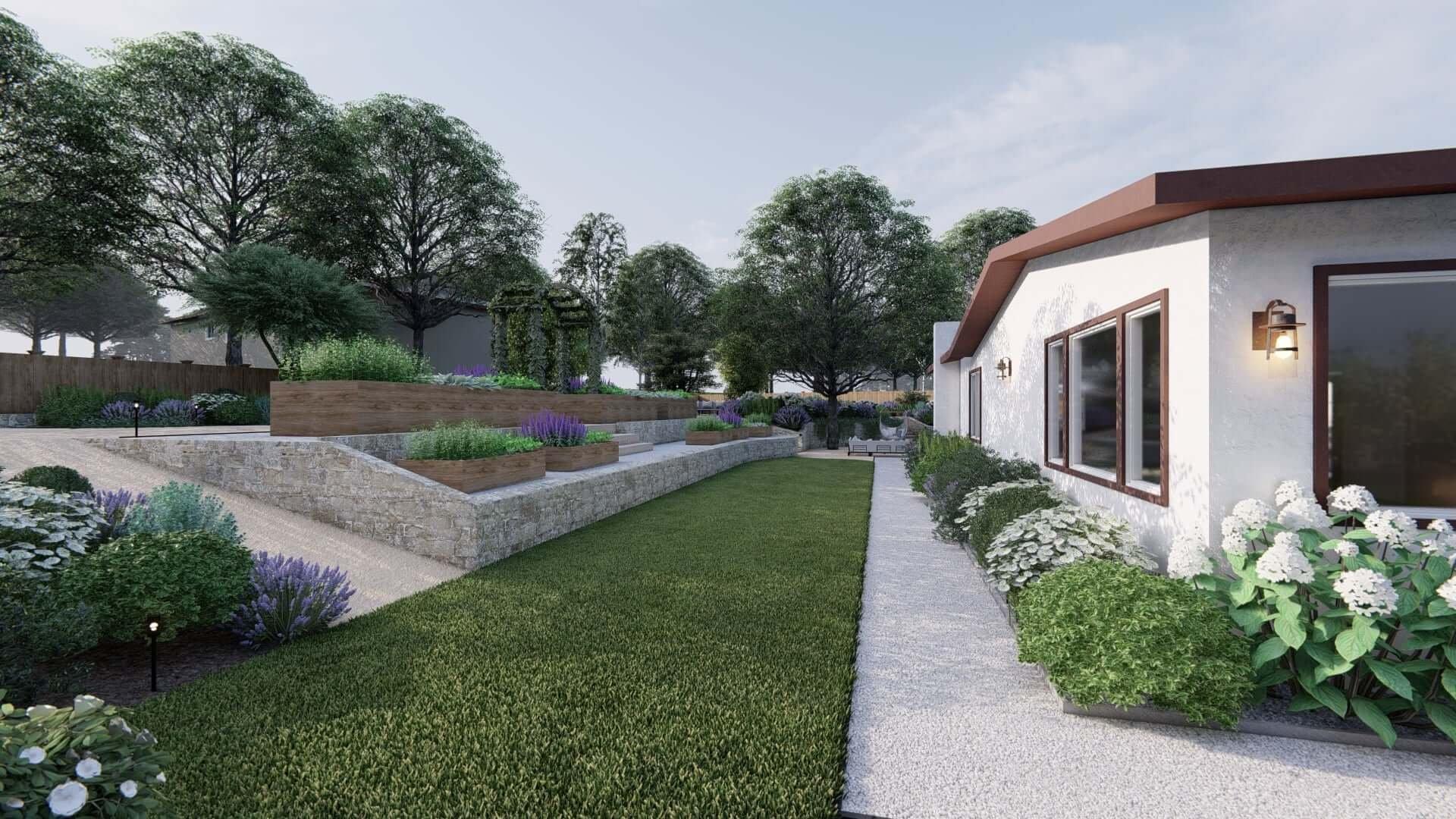
Raised garden beds are not only practical but also serve as an eye-catching design element in contemporary landscapes. These elevated structures transform ordinary yards into lush retreats, allowing for a range of planting options. Imagine creating a series of layered beds that add depth and dimension to your outdoor space. You can choose from materials such as wood, metal, or stone to suit your aesthetic preferences and harmonize with existing architecture. Additionally, raised beds can enhance soil quality and drainage, allowing for healthier plants and easier access for gardeners of all ages.
To further enhance functionality, you can incorporate multi-level designs where vegetables, herbs, and flowers coexist, making your garden not just a source of sustenance but also a vibrant work of art. Consider adding integrated seating around these beds to create inviting spaces for relaxation or family gatherings. With drip irrigation systems and permeable decking, you can ensure a sustainable approach to gardening. Explore creative ideas like vertical gardens or trellised vines to maximize your planting potential. For additional inspiration and ideas, visit Gardenista.
Design for seasonal changes to ensure year-round beauty in modern landscape design
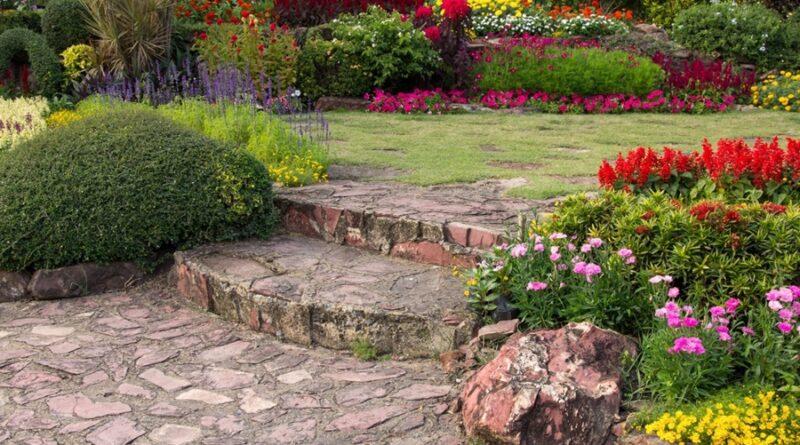
When crafting a stunning modern landscape, it’s essential to embrace the beauty of each season. By carefully selecting plants and materials that thrive year-round, you can create a dynamic outdoor space that evolves beautifully with nature. Perennial flowers can act as anchors for your design; consider integrating varieties that bloom at different times to provide color from spring through fall. Ornamental grasses are not only visually striking but also maintain their texture in winter, adding depth to your landscape during the colder months. Vibrant fall foliage from trees and shrubs turns your garden into a canvas of warm hues, while a well-planned hardscape using natural stones can provide stability and visual interest throughout the year.
Additionally, creating seasonal focal points ensures that your landscape holds charm in every phase. Installing decorative planters allows you to change out seasonal blooms like pansies in spring and chrysanthemums in fall, adding to the visual drama. Incorporating evergreen shrubs provides a lush backdrop during winter’s dormancy, while strategically placing ever-blooming perennials ensures color transitions fluidly through the seasons. Don’t forget the powerful impact of lighting; using soft LED fixtures can highlight your landscape’s features, like a charming path or a beautiful tree, keeping the magic alive even on long winter nights. For further inspiration, explore resources like Garden Design.
Introduce outdoor art to personalize your modern landscape design
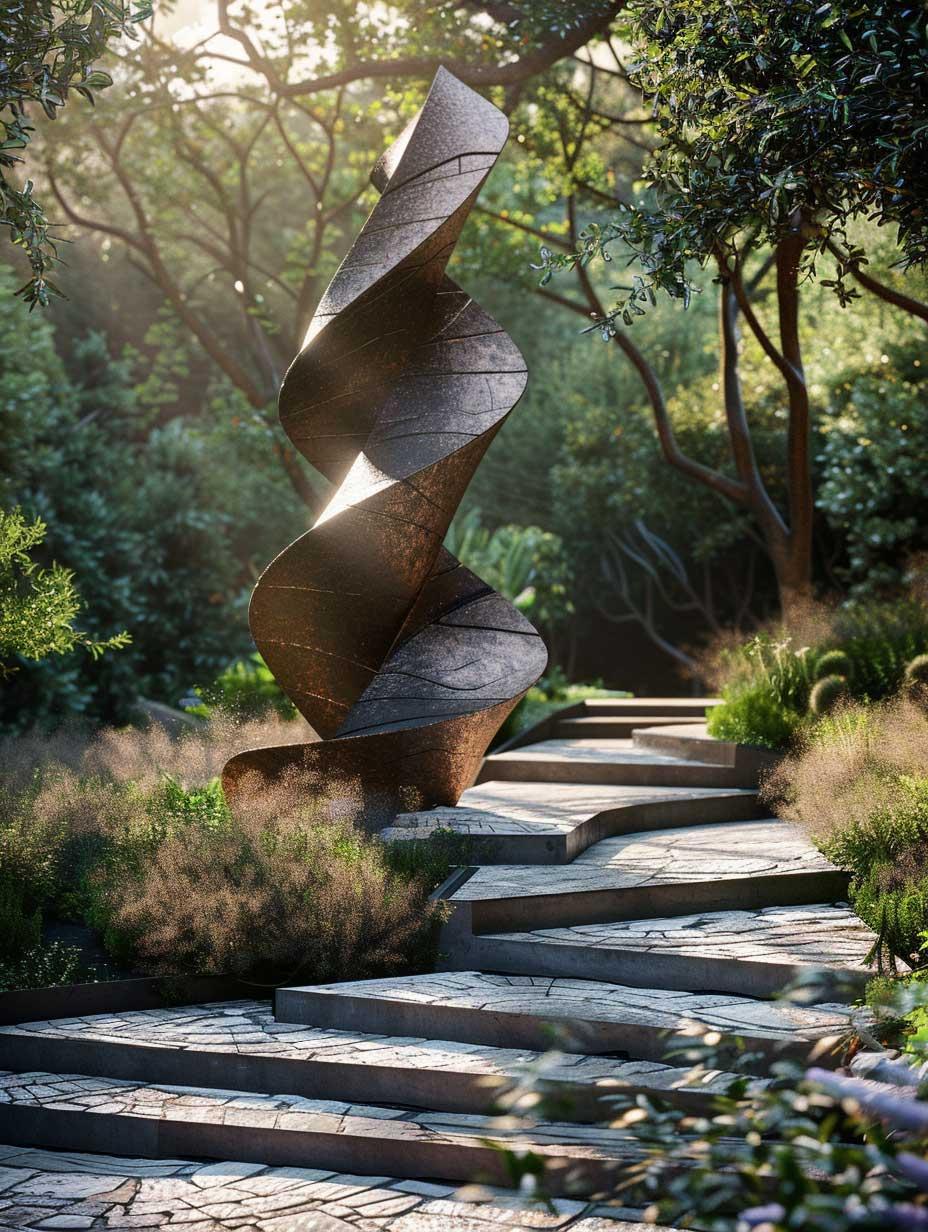
Incorporating outdoor art into your landscape design can create a captivating visual narrative that reflects your personal style. Start by considering various forms of outdoor art that can breathe life into your space. Sculptures can serve as striking focal points, whether they are abstract representations or nature-inspired pieces. Mosaic tiles can be integrated into walkways or patio areas, adding color and texture that engage the senses. Garden murals can transform blank walls into vibrant extensions of your landscape, making them feel like part of the natural surroundings. Additionally, hanging art made from natural materials like wood or metal can pull the eye upwards and create an interesting conversation piece in your garden’s design.
To enhance your outdoor art experience, think about incorporating interactive elements that invite engagement. Wind chimes or kinetic sculptures can introduce movement into the landscape, turning even a subtle breeze into a delightful experience. Water features, such as small fountains that double as art installations, can add soothing sounds and a cooling element to your garden. You might also explore planters designed as art pieces, showcasing plants in unique, creative containers that draw attention while providing greenery. The goal is to harmonize art with the natural environment, resulting in a modern landscape that resonates with your personality and lifestyle. For more inspiration on integrating art into your garden, visit Garden Design.
Utilize gravel pathways for an inviting touch in modern landscape design
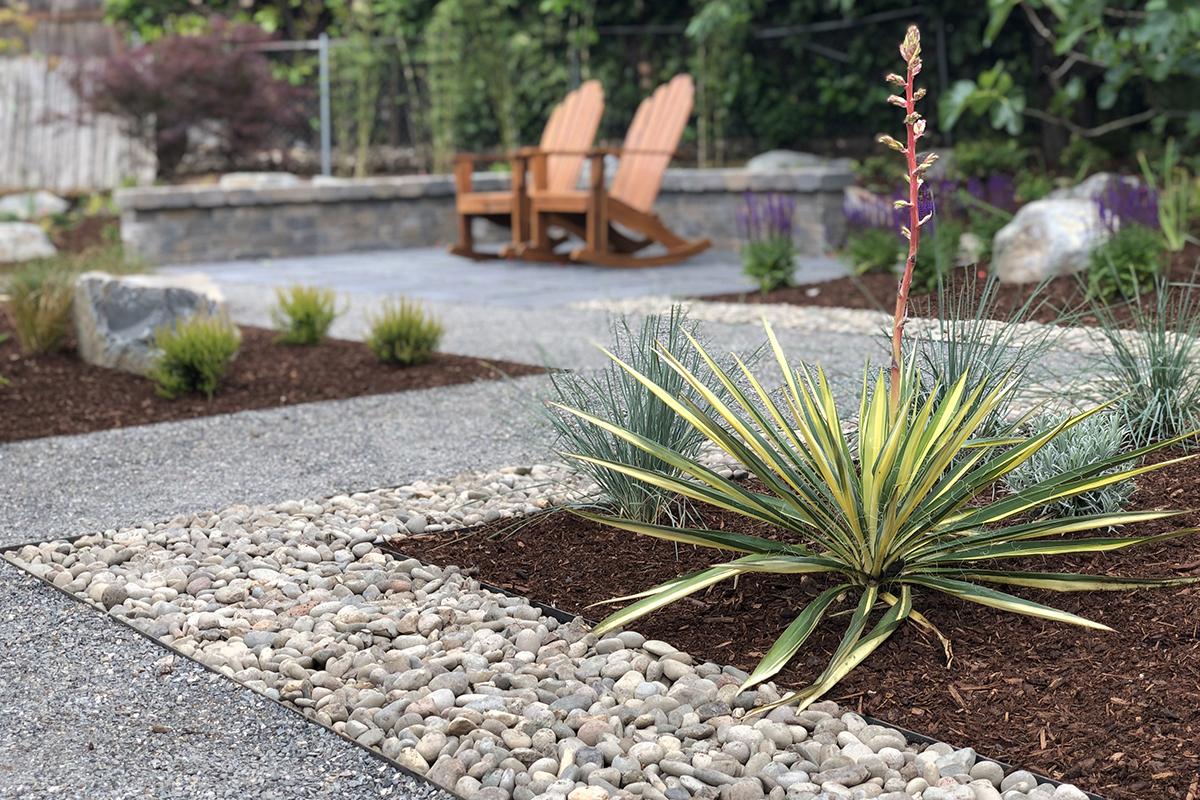
Gravel pathways seamlessly blend functionality and aesthetics in modern landscape design, creating a welcoming ambiance that draws the eye and invites exploration. Whether framed by lush greenery or bordered by minimalistic stone features, these pathways break the rigidity of traditional hardscaping materials. You can choose from a variety of gravel types—such as smooth river stones, crushed granite, or angular limestone—to suit your design palette. Incorporating gravel not only allows for effective drainage but also provides an opportunity for creating alluring patterns. Imagine winding paths that meander through your garden, guiding visitors through a tactile experience that connects them to nature.
To enhance the inviting nature of gravel walkways, consider these design elements:
- Edging Materials: Use wooden timbers, steel borders, or natural stone to frame the path, adding definition and contrast.
- Planting Areas: Integrate lush foliage and colorful flowers alongside the path to soften the look and provide bursts of color throughout the year.
- Lighting Features: Install low-voltage lighting or solar lanterns to create a charming atmosphere, making it enjoyable to wander even after dusk.
- Bench Nooks: Incorporate small seating areas along the path, offering tranquil spots for relaxation amidst the landscape.
When done thoughtfully, gravel pathways serve as more than merely a way to navigate the landscape; they become a statement piece that enhances the overall design. For more inspiration on how to create beautiful pathways, visit Garden Design.
Blend indoor and outdoor spaces seamlessly with modern landscape design
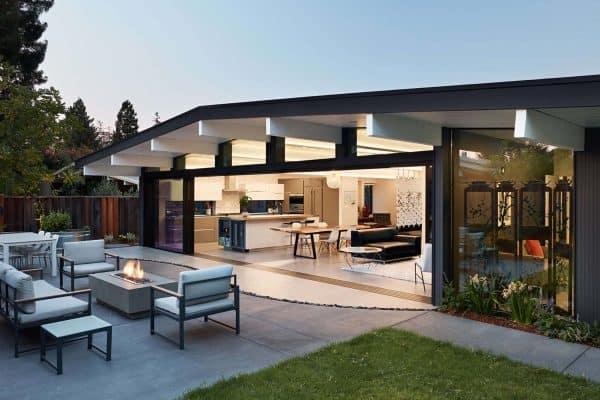
Utilizing open-concept layouts can transform the flow between indoor and outdoor environments. Consider installing expansive glass doors that slide open to reveal a beautifully designed patio or garden, blurring the lines between home and nature. Incorporate natural materials such as wood and stone for decks and walkways, creating a harmonious transition from the inside to the outside. By integrating built-in seating and fire pits, you can extend your living area outdoors, making it perfect for entertaining or quiet evenings under the stars.
Another innovative approach is to implement vertical gardens or “living walls” that can bring lush greenery into both the interior and exterior spaces. These not only enhance air quality but also serve as a stunning focal point. To make the most of your landscape, consider using multi-functional features—like a garden that doubles as a subtle privacy screen or decorative water features that provide both aesthetic charm and soothing sounds. For further inspiration, check out the design ideas at ArchDaily to discover how modern landscape design can elevate your home.
Foster wildlife-friendly plants to promote biodiversity in modern landscape design
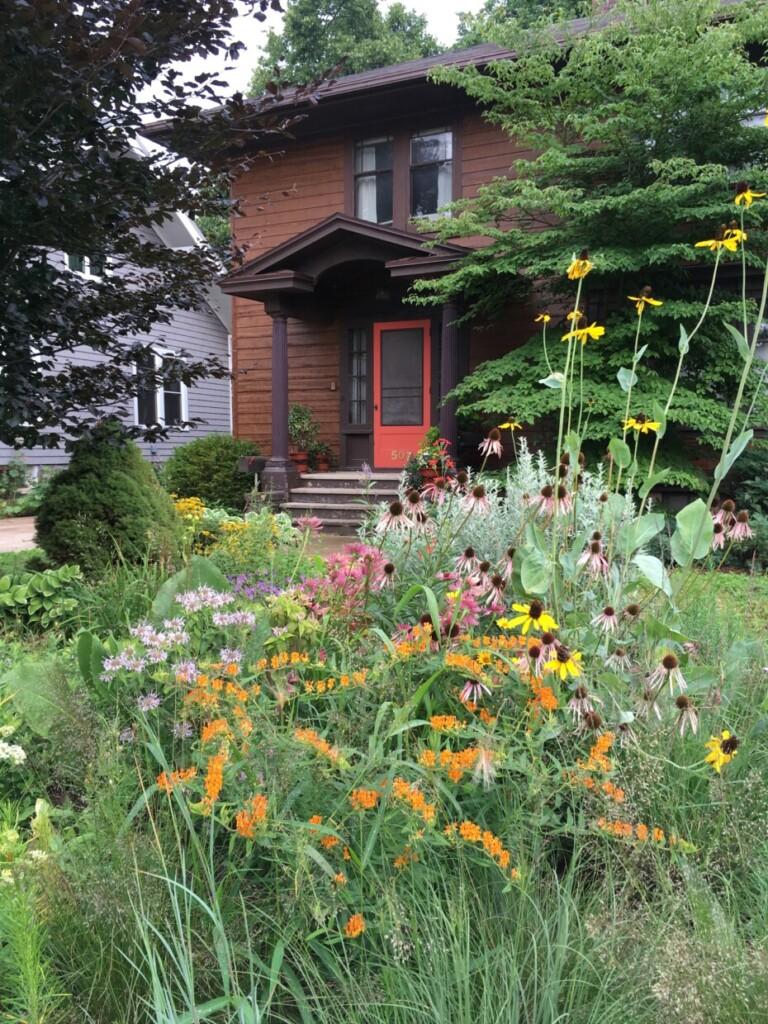
- Native Wildflowers: Choosing wildflowers that are indigenous to your area encourages pollinators and supports the local ecosystem. Consider species like Black-eyed Susan, Coneflower, or Milkweed, which are not only visually appealing but also attract butterflies and bees.
- Fruit-Bearing Plants: Incorporate berry bushes, apple trees, or even edible ground covers. These not only provide food for humans but also become vital food sources for birds and small mammals, enhancing your garden’s biodiversity.
- Native Grasses: Opt for ornamental grasses native to your region, such as Blue Grama or Little Bluestem. They require less water, reduce maintenance, and provide habitats for wildlife while adding texture and movement to your landscape.
- Insect Hotels: Design a space with hollow stems, bark, and dry leaves to create microhabitats for beneficial insects. This additional architectural feature beautifully blends function with form.
| Plant Type | Benefits |
|---|---|
| Milkweed | Supports Monarch butterflies |
| Echinacea | Long-lasting blooms for pollinators |
| Serviceberry | Provides fruit and shelter for birds |
| Sedum | Attracts beneficial insects, drought-tolerant |
Creating a diverse selection of plants in your landscape not only promotes biodiversity but also creates an ecosystem that thrives year-round. By cultivating areas of your yard or garden with diverse, wildlife-friendly plantings, you can witness firsthand the many creatures that benefit from your choices. Opt for plants that bloom at different times throughout the season to ensure that food sources are available to wildlife across various months. This turns your outdoor space into a vibrant, living tapestry filled with color, texture, and life.
Additionally, consider implementing water features or native hedgerows that act as corridors for wildlife. These elements not only provide essential resources for animals but create serene settings that enhance the modern design of your landscape. The integration of functional planting not only serves aesthetic purposes but also plays a crucial role in restoring ecological balance. For more inspiration on fostering wildlife-friendly landscapes, visit [NWF.org](https://www.nwf.org).
Create outdoor rooms to enhance comfort in modern landscape design
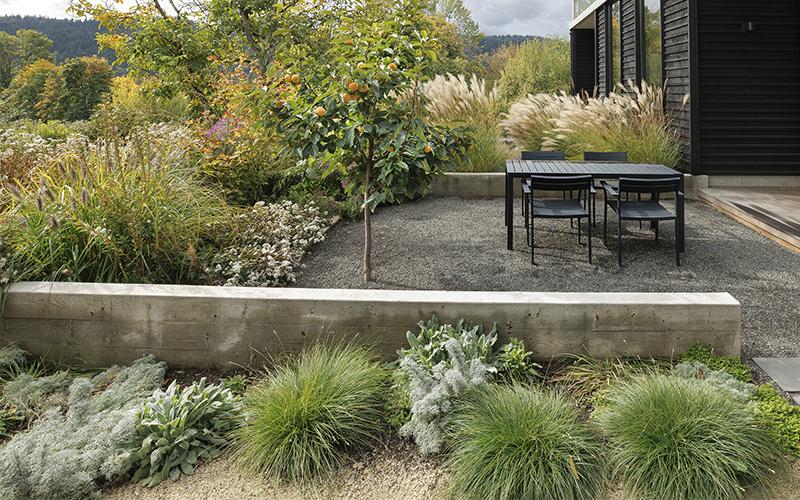
Transform your outdoor space into a welcoming sanctuary by creating distinct outdoor rooms that offer both function and comfort. Consider designing a cozy seating area surrounded by lush greenery, complete with comfortable furniture, throws, and ambient lighting to foster relaxation. For a more sophisticated touch, integrate a fire pit or outdoor fireplace to extend usability into the cooler evenings, becoming a gathering point for family and friends. You could also add a kitchen space, featuring a grill, sink, and countertop, to make al fresco dining a delightful experience. Incorporating potted plants, vertical gardens, or shade structures can enhance the aesthetic appeal while ensuring privacy and comfort.
To elevate the sense of tranquility in these outdoor spaces, consider adding elements such as a water feature like a fountain or pond, which not only beautifies the environment but also creates soothing sounds that drown out the noise of the outside world. Another popular choice is a dining area defined by elegant furniture and ambient light, drawing people to enjoy meals amidst nature. You can even use screened gazebos or pergolas to provide shelter from the elements, making the space functional year-round. Explore more ideas for these transformations at architecturaldigest.com to enhance your modern landscape design.
Use minimalism to evoke calm in your modern landscape design
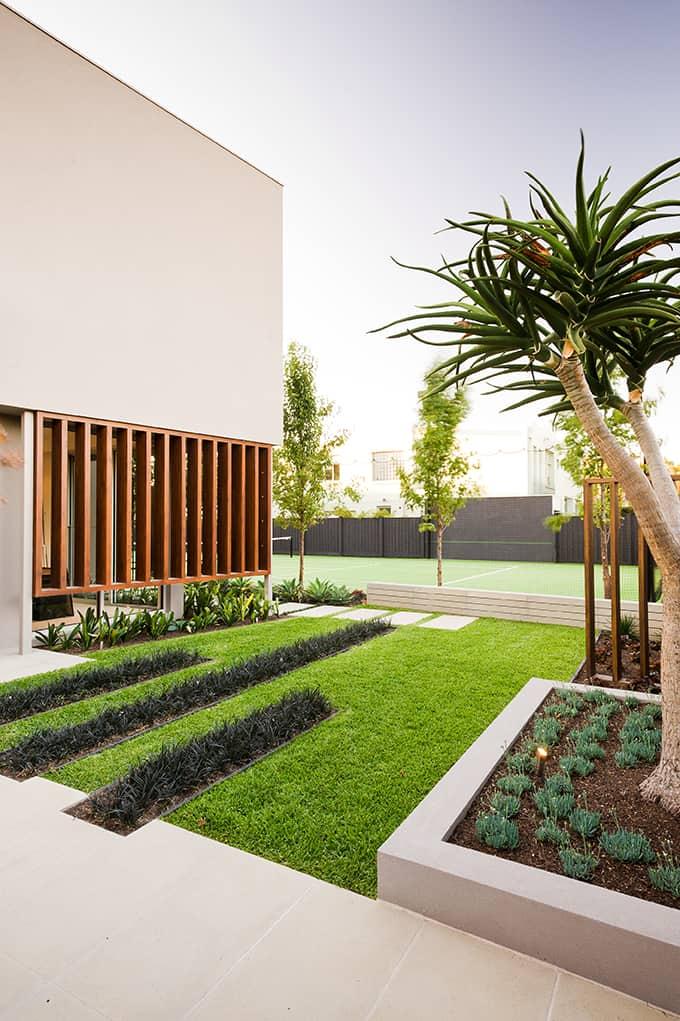
In the hustle and bustle of modern life, finding tranquility at home is essential. One of the most effective ways to achieve this is through minimalism in landscape design. By prioritizing simplicity, you can create an outdoor space that encourages peace and introspection. Start with clean lines and simple shapes; consider using geometric planters or a straightforward pathway to guide the eye. Incorporating neutral colors such as soft whites, pale grays, and muted greens can enhance the calming effect, allowing for a seamless blend with nature’s palette.
To further promote an atmosphere of serenity, focus on incorporating natural materials and a limited number of plants. Opt for a few statement pieces like an elegant tree or a large boulder to serve as focal points in your landscape. This approach not only minimizes clutter but enhances the beauty of each element. Adding functional seating, such as a simple wooden bench, can also provide a place for quiet reflection. Consider exploring resources on natural landscaping techniques at landscapearchitecture.org for inspiration on creating a cohesive and tranquil outdoor environment.
Foster community interaction with shared spaces in modern landscape design
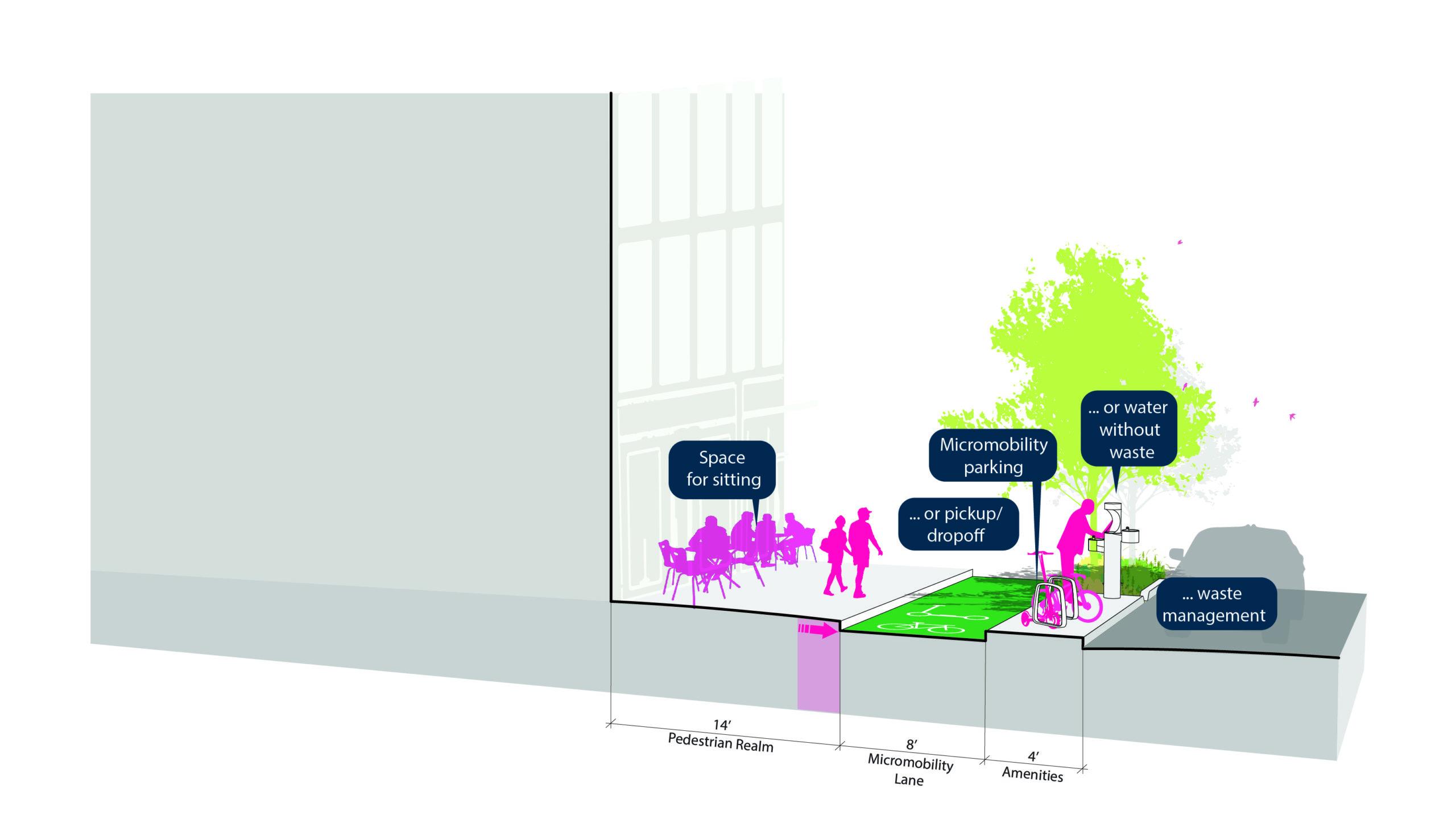
Modern landscape design is an opportunity to create vibrant shared spaces that encourage community interaction. By incorporating elements that invite people to linger, collaborate, and connect, designers can transform underutilized areas into thriving hubs of social engagement. Key ideas include:
- Community Gardens: Designate areas where residents can cultivate flowers, herbs, and vegetables, fostering a sense of ownership and responsibility.
- Multi-Use Open Spaces: Create flexible areas that can host various events, such as farmer’s markets, movie nights, or yoga classes, adaptable to different community needs.
- Interactive Art Installations: Include public art that encourages participation, transforming static displays into dynamic experiences.
- Outdoor Meeting Pods: Design cozy gathering spots, equipped with seating and Wi-Fi, for casual meetings or socializing.
- Natural Playgrounds: Use natural materials to provide children with engaging, safe play areas that encourage creativity and exploration.
Incorporating eco-friendly elements can also enhance community interaction. For example, adding rain gardens not only improves drainage and biodiversity but also serves as educational tools about sustainability. Likewise, permeable pavements can be integrated into pathways, inviting community members to walk, cycle, or skate while minimizing environmental impact. Explore practical applications and innovative ideas for community spaces at Planetizen.
| Design Element | Benefit |
|---|---|
| Community Gardens | Promote local food and bonding |
| Outdoor Meeting Pods | Encourage collaboration and interaction |
| Interactive Art | Foster creativity and connection |
| Natural Playgrounds | Enhance child development and community |
To Conclude
As we wrap up our journey through 24 inspiring ideas for modern landscape design transformations, we hope you’ve found a spark of creativity to ignite your own outdoor spaces. From the serene elegance of minimalist gardens to the vibrant charm of eclectic plant arrangements, these concepts invite you to reimagine the possibilities that lie just beyond your doorstep.
Remember, the essence of modern landscape design lies not only in aesthetics but also in the connection it fosters between nature and humanity. Whether you choose to embrace sustainable practices, implement innovative materials, or simply foster a sense of tranquility, every transformation starts with a single idea.
So step outside, breathe in the possibilities, and let your imagination roam wild. Your dream landscape is waiting to be realized—one inspired idea at a time. Happy designing!
